Tens of Thousands of Academic Workers Go on Strike Across 10 UC Campuses
UC Santa Barbara Picket Line Part of Largest Walkout in History of U.S. Higher Education
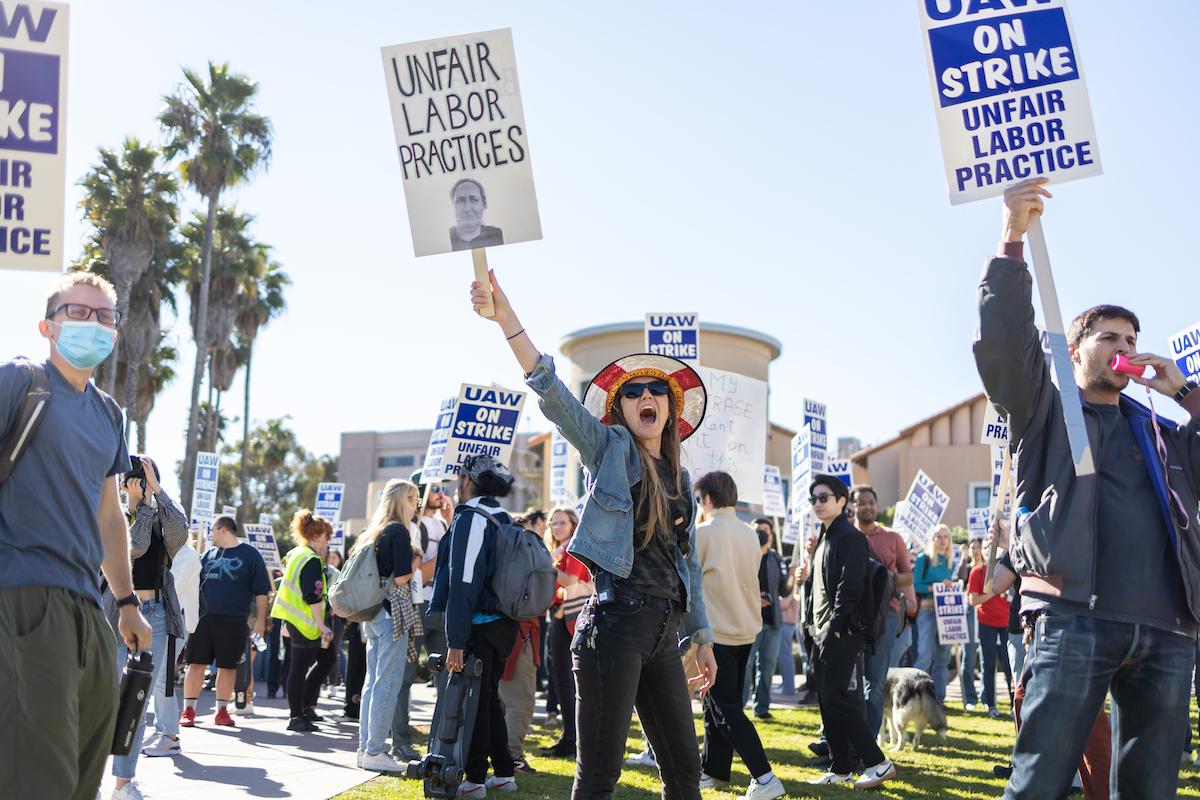
The sound of beating drums, hundreds of shuffling feet, and various impassioned chants such as “U-C-S-B — keeping us in poverty!” rang out across the UC Santa Barbara campus as a mobile picket line marched through the University’s grounds on Monday, marking the first day of the largest walkout in the history of U.S. higher education.
Striking employees at UCSB make up about 3,100 of the total 48,000 academic workers represented by the United Auto Workers union (UAW) — including teaching assistants, postdocs, academic student employees, graduate student researchers, academic researchers, readers, tutors, and more — from all 10 campuses of the University of California protesting against 28 alleged Unfair Labor Practices committed by the University.
According to union representatives, these alleged unlawful practices have interfered with the union’s ability to bargain effectively for a better contract to meet the cost of living, among other proposals.
The union claims that the University has failed to meet its legal obligations in the bargaining process, by “unilaterally implementing changes” regarding factors such as compensation, “bypassing the bargaining process by announcing changes and instituting policies outside of bargaining,” “refusing to provide necessary and relevant information” in regard to bargaining, and “directly surveying” UAW unit members about bargaining topics.
One charge was filed in relation to UCSB specifically, concerning the Molecular, Cellular, and Developmental Biology Department, accusing the university of “unilaterally changing compensation, direct dealing, [and] failing to bargain lawfully.”

“The strike is not about wages, the strike is about the University’s behavior, which is preventing us from being able to work with them in good faith,” said Evan Plunkett, a postdoc at UCSB and the postdoc unit chair for UAW-5810. “One of the main goals, across all units, is the elimination of rent burden. But right now, and for the indefinite future, the goal is to get the UC to work with us. Negotiations are ongoing, but some progress has been made in the past week that gives us some hope that they are starting to understand what is going on and what is at stake.”
According to the union’s website, “92% of graduate workers and 61% of postdoctoral scholars are rent-burdened,” meaning they pay more than 30 percent of their income for housing. In addition, membership surveys by UAW found that “40% of graduate workers report spending more than half of their income on rent.”
Considering Santa Barbara’s current housing crisis, that burden can weigh heavily on UCSB’s academic workers.
“The rent burden is eating up about 55 percent of my paycheck right now,” said Misa Nguyen, a graduate student and TA for Greek mythology at UCSB. “Last month, one of my family members in NorCal had to visit the ER suddenly, and their insurance didn’t cover it, so I had to send money back to help with that. After I helped with the ER visit, and after I paid my rent, I had $50 left in my bank account for the rest of the month.”
Nguyen explained that as a result, she had to skip meals and keep her heater off to make it through the month. Although she noted that that was a particularly rough month, one of Nguyen’s main points as a speaker during Monday’s rally was that the University does not pay its graduate workers “enough to both pay rent and eat three square meals a day.”
The UC’s student workers make an average of about $24,000 annually; the unions are calling for a base annual salary of $54,000 for all grad workers and a $70,000 salary for postdocs.
In negotiation, the UC proposed adjusting salary scales and hourly wages for each bargaining unit, which includes initial increases in the range of 4 to 8 percent and additional, annual increases ranging from about 3 to 6 percent in each subsequent contract year.
For reference, UC’s proposal would mean that in the first year of the contract, that average annual wage for student workers would only increase by an estimated amount of $960 to $1,920.

“This strike is meant to make them see all of us, and care,” Nguyen said.
A significant majority of the teaching and research at UC is performed by academic workers. Nguyen mentioned that, officially, TAs are only expected to work about 20 hours per week; during grading season and midterms, however, they have put in a far greater amount of time to meet their workload. “This quarter I had to grade 80 student papers in two weeks, on top of teaching and everything else,” she said.
With finals just a few weeks away, interference with instruction and research seems inevitable as these employees prepare to keep the strike going until their requests are met.
“We are willing to bring the University’s functions of education and teaching to a halt. We are willing to stop classes, to stop lectures. We are willing to withhold grades; that is going to be our biggest weapon, because the grading deadline is December 14,” Nguyen said. “People need grades, and we are willing to withhold those grades. And we have massive undergraduate support to understand why we have to withhold grades.”
Sign up for Indy Today to receive fresh news from Independent.com, in your inbox, every morning.
One UCSB undergraduate student, who requested to be referred to as J.D., was on the picket’s sidelines with Food Not Bombs, a student organization that prepared food for protesters and is planning on doing so for the remainder of the strike.
“A lot of the TAs are saying, ‘I really do want to teach, but I have to strike,’ because they need to make a living,” J.D. said. “There are a lot of difficulties where, for example, a lot of peoples’ financial aid … [relies] on their grades. So, not grading can be dangerous. Despite the fact that financial aid students like me risk losing their financial aid, I haven’t heard any undergraduate students say anything negative about the strike.”

UCSB faculty also seems to be generally supportive of the strike, across the various disciplines. A group of professors and other faculty members dressed in regalia and holding signs in solidarity were greeted by their students as they marched alongside them.
Charmaine Chua, an assistant professor in the Global Studies department at UCSB, said she came back to campus from sabbatical to show her support and mobilize fellow faculty members “to help them understand their ability to cancel classes,” and remind them that they have “the legal right to respect the picket line, which is guaranteed under HEERA,” the Higher Education Employer-Employee Relations Act.
“I was a grad student not so long ago,” Chua said. “I experienced what our graduate students are experiencing, which is poverty wages making it really hard for them to do what they want to do: study to become faculty. Now that I am here, as a tenure-track faculty member, I think it is an ethical and political obligation to use my structural position and my privilege to show up on the line for graduate workers, on whose labor my job depends. It wouldn’t be possible to teach large lectures without grad workers; it wouldn’t be possible to conduct research without student researchers. The UC underpays these workers, despite the fact that they are essential to the University.”
The UC denies the allegations that they have engaged in illegal labor practices. In response to the strike, the UC issued the following statement: “Our campuses have been preparing to mitigate the impact of any strike activity on our students by ensuring, to the extent possible, continuity of instruction and research. This includes encouraging departmental and academic units to provide additional support and resources to students for learning. Additionally, campuses will be prepared for contingencies should a strike interfere with the conclusion of the academic term.”
In the latest update by the UC, they stated that they have proposed to the UAW enlisting the assistance of a third-party, neutral private mediator so they can “achieve a compromise.” Furthermore, they said, following negotiations through the weekend, the resulting, current University proposal “would set the standard for graduate employee support among public research. It is important to note that our graduate student employees work strictly on a part-time basis while earning their graduate or doctoral degree, and that compensation is just one of the many ways in which they are supported as students during their time with the University.”

On Monday evening, Rafael Jaime, president of UAW Local 2865, issued an update on the union’s progress at the bargaining table. “UAW bargaining team members met with UC officials today [and] … reached three Tentative Agreements, showing progress among the parties. …”
“We are hopeful they will agree to include all of our compensation in our contract,” Jaime continued, “as is the norm across every other industry, so we can make progress at the table and get UC moving again.”
For now, though, he stated, “UAW members at UC remain on strike, and we will be walking picket lines tomorrow.”
Update: This story was updated on November 15 to add information about the alleged unfair labor practices, the pay increases being offered by the UC, and TA’s workload.
Support the Santa Barbara Independent through a long-term or a single contribution.

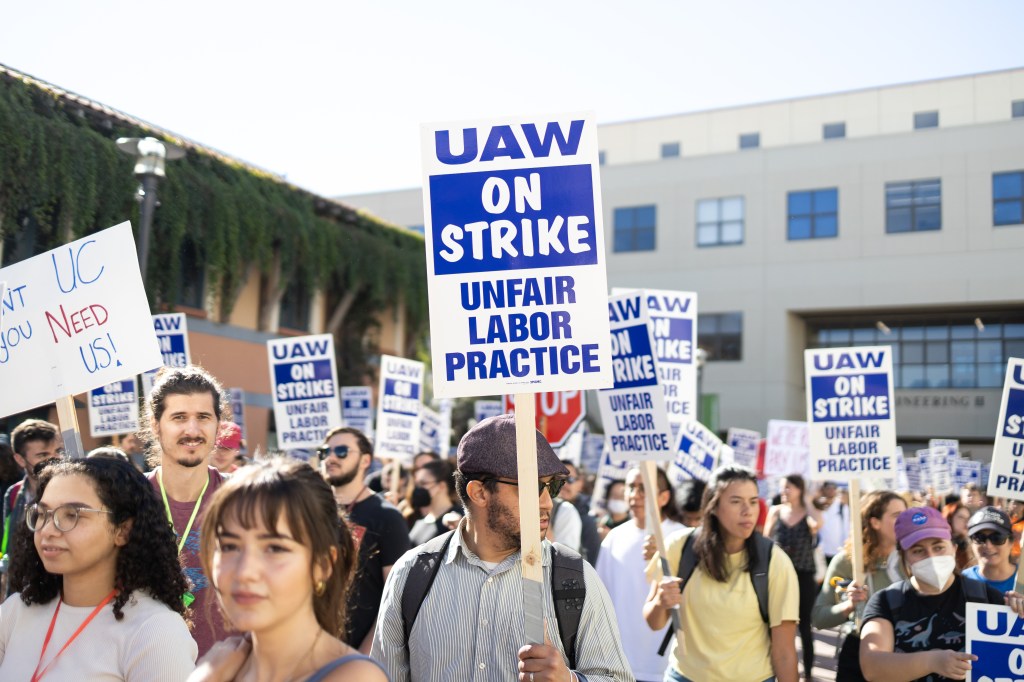
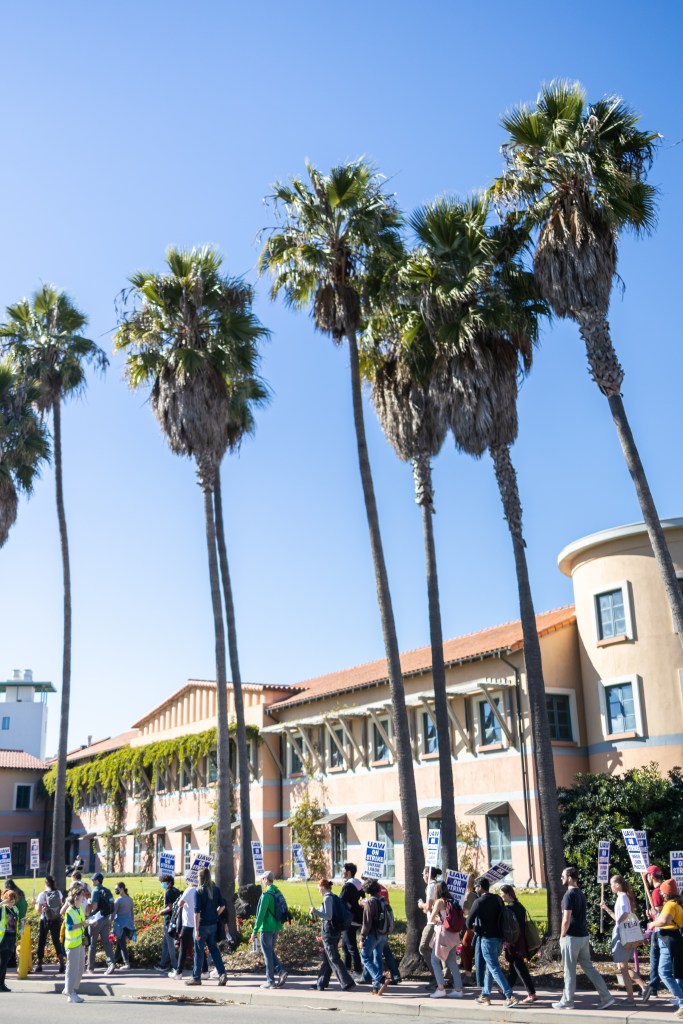
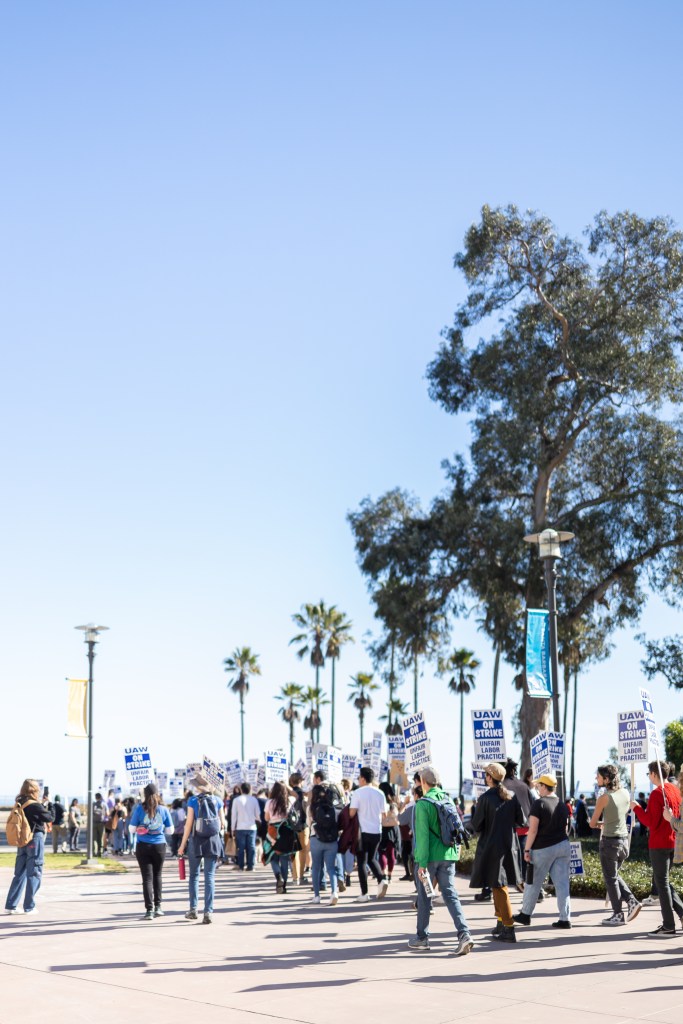
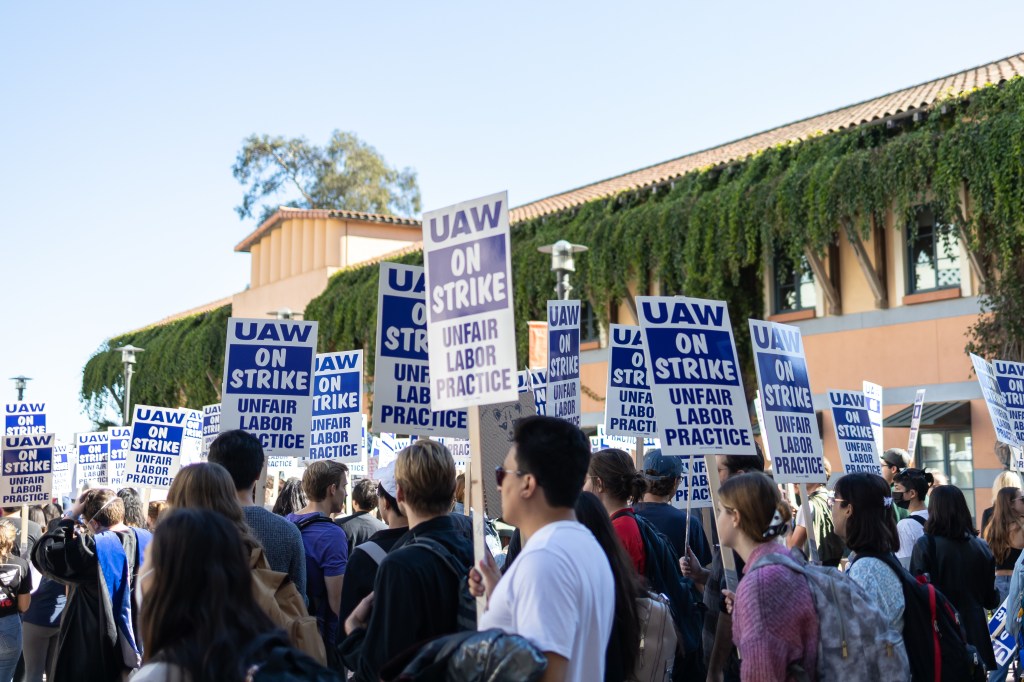
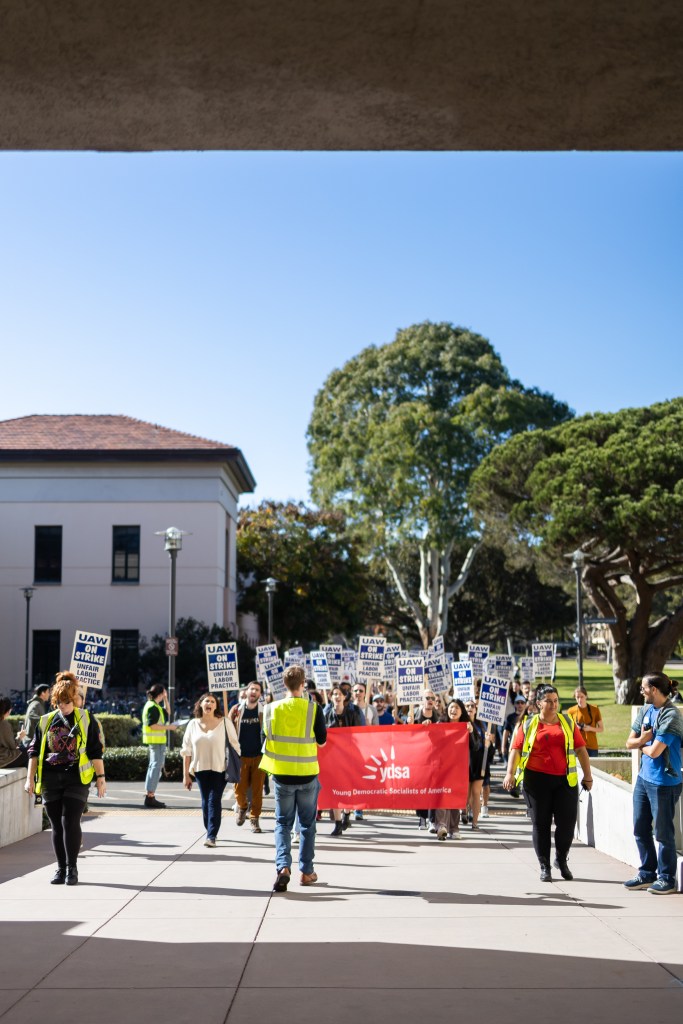
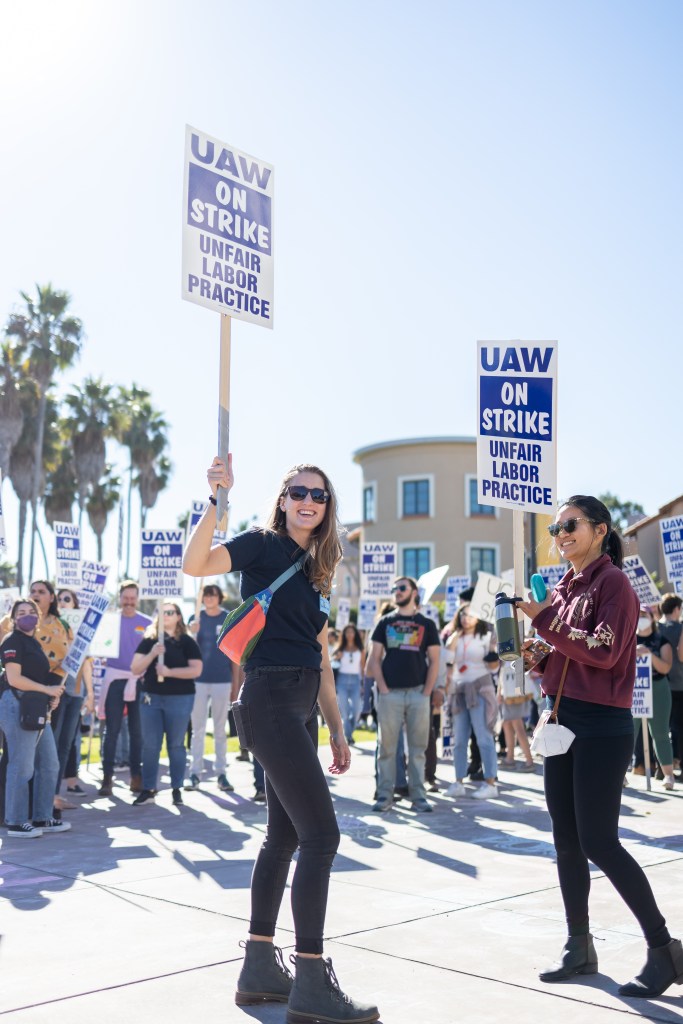
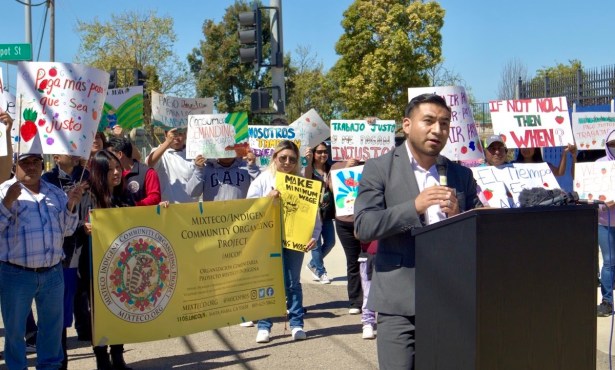
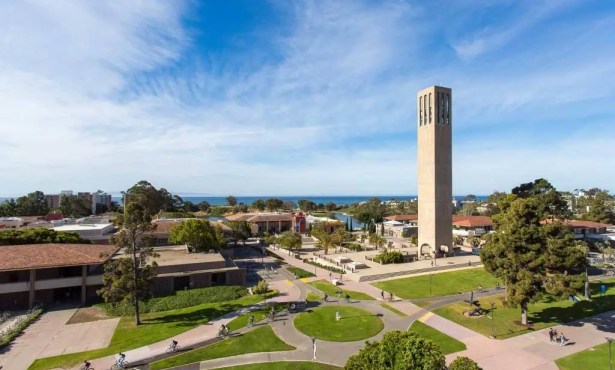
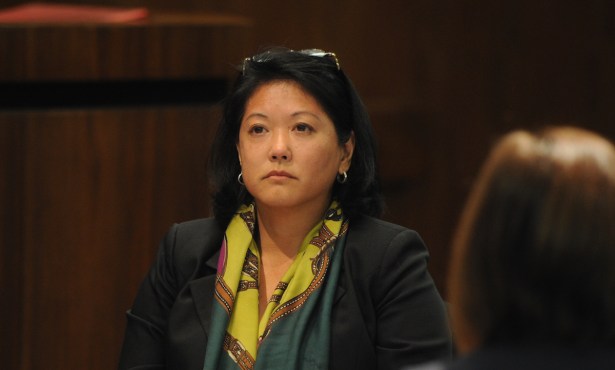
You must be logged in to post a comment.